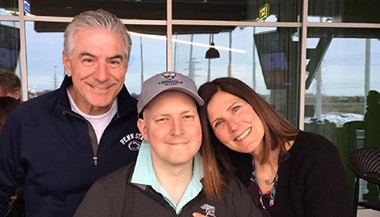Types of Testicular Cancer
The most common type of testis cancer is a germ cell tumor. There are two main types of GCT: seminoma and nonseminomatous germ cell tumors (NSGCT). Both seminoma and NSGCT occur at about the same rate, and men can have seminoma, NSGCT or a combination of both. There are several differences between seminomas and NSGCT, but the initial distinction is based on how the tumor looks under the microscope.
Seminoma
Seminomas tend to grow and spread more slowly than NSGCT, although some seminomas can grow very rapidly. Subtypes of seminoma include:
-
Classic seminoma: 95 percent of seminomas are classic
-
Spermatocytic seminoma: tend to occur in older men and has an excellent prognosis
Seminomas can secrete human chorionic gonadotropin (HCG) but do not secrete other tumor markers. If seminoma spreads from the testicle, it is most often and best treated with chemotherapy and/or radiation. Surgery can be performed in some cases.
Nonseminomatous Germ Cell Tumors
NSGCT are very variable in appearance and prognosis. There are four main types of NSGCT that can appear alone, but most often appear as a “mixed” NSGCT, with more than one type present:
-
Embryonal carcinoma: present in about 40 percent of tumors and among the most rapidly growing and potentially aggressive tumor types. Embryonal carcinoma can secrete HCG or alpha fetoprotein (AFP).
-
Yolk sac carcinoma: the most common type of tumor in children; responds well to chemotherapy in children and adults. Yolk sac tumors almost always secrete AFP.
-
Choriocarcinoma: very rare and very aggressive form of testis cancer. Can secrete HCG.
-
Teratoma: most often appear as a mixed NSGCT; usually grow locally but can appear in retroperitoneal lymph nodes. Teratoma is chemotherapy- and radiation-resistant and best treated with surgical removal.
Stromal Tumors
Tumors can also develop from the supportive tissues around the germ cells in the testicle. These tumors are rare, making up less than 5 percent of testis cancers, and have an excellent prognosis if surgically resected. There are two types of stromal tumors:
-
Leydig cell tumors: Leydig cells make the male hormone testosterone and are most often cured with surgery.
-
Sertoli cell tumors: Sertoli cells support and nourish the developing sperm and are usually benign tumors.



